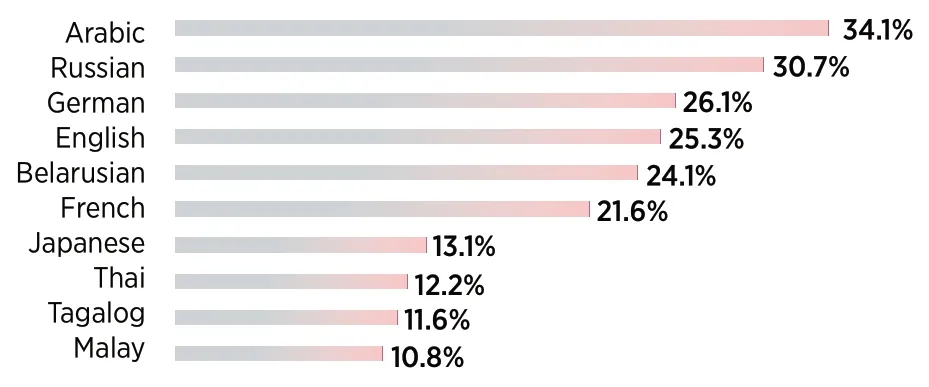Golden Age of Southeast Asian Language Professionals
By Luo Tongfang
Deepening cooperation between China and ASEAN is creating more job opportunities for people with command of Southeast Asian languages

(VECTORSTOCK)
April is recruitment season for most new college graduates.But Chen Xiao,a 2022 graduate majoring in Vietnamese at Yunnan Minzu University(YMU),already received an offer from Chinese tech giant ByteDance,during winter break.After graduation,Chen will join the company’s Vietnam marketing department as a translator.
Chen said that most of her classmates majoring in Vietnamese have also found jobs.“Compared with students majoring in ‘major languages,’graduates of YMU’s School of South Asian and Southeast Asian Languages and Cultures have an easy time finding a decent job,”Chen said.
Chen Xiao is among graduates who studied languages from Southeast Asian countries.In recent years,the Belt and Road Initiative’s ongoing development has boosted demand for language talent from China.On April 1,the Translators Association of China (TAC) issued the Translation Talent Development Report 2022 which stated that demand for talent in languages including English,French,Russian,Spanish and Arabic has been declining while translators commanding languages from countries along the Belt and Road have become more and more needed.
As China and ASEAN countries deepen their cooperation in trade and cultural exchange,Chinese people who speak the local languages of Southeast Asian countries fluently and understand the countries’ cultures have become highly sought after.In January 2022,the Regional Comprehensive Economic Partnership (RCEP) entered into force,heralding a golden age for talent commanding Southeast Asian languages.
The booming economic and trade exchanges greatly boosted the market demand for ASEAN languages services.
High-quality Language Services
The Report on the Development of China’s Translation and Language Services Industry 2022 issued by the Translators Association of China (TAC) on April 1 listed the top ten languages urgently needed in the language service industry in 2021.Languages from Southeast Asian countries including Thai,Tagalog,and Malay were listed in the report.
The need for services in Southeast Asian languages is increasing because China and the Southeast Asian countries are engaging in more frequent economic and trade cooperation.
In 2020,according to January 2021 statistics from the General Administration of Customs of China,the value of trade between China and ASEAN reached 4.74 trillion yuan(US$729 billion),and China and ASEAN became each other’s biggest trade partners for the first time.
Even as world trade was pummeled by the COVID-19 outbreak,trade between China and Southeast Asian countries maintained growth momentum.Statistics from China’s Ministry of Commerce showed that in 2021,trade between China and ASEAN reached US$878.2 billion,yearon-year growth of 28.1 percent,with ASEAN being China’s biggest trade partner for the second successive year.Vietnam,Malaysia,and Thailand are the three largest trading partners of China in ASEAN.The total value of two-way investment between the two sides added up to US$300 billion at the end of 2021.
The booming economic and trade exchanges greatly boosted the market demand for ASEAN languages services.The Report on the Development of China’s Translation and Language Services Industry 2022 showed that in the recent two years,93.8 percent of companies seeking language services are engaged in frequent trade and investment activities with the Belt and Road countries,and nearly a third of companies have economic and trade relationships with Singapore(29.4%),Malaysia (27.6%),and Thailand (26.1%).
On January 1,2022,the RCEP signed by China,Japan,the ROK,Australia,New Zealand,and the 10 ASEAN countries entered into force officially,creating the free trade zone with the biggest population,the largest economic and trade scale,the most diverse member composition,and the greatest development potential ever.
China was among the first group of countries to sign the RCEP.In the first two months after the pact entered into force,trade value between China and ASEAN increased 13.1 percent year on year.As Chinese companies began more actively participating in RCEP trade,demand for relevant language services shot up.

TheReport on the Development of China’s Translation and Language Services Industry 2022showed that in the recent two years,93.8 percentof companies seeking language services are engaged in frequent trade and investment activities with the Belt and Road countries and nearly a third of companies have economic and trade relationships withSingapore(29.4%),Malaysia(27.6%),andThailand (26.1%).
Talent Development
“Employment opportunities for students who majored in Southeast Asian languages are abundant,so they have more career options,”said Zhang Suhua,a Malay teacher at the School of Asian Studies of Beijing Foreign Studies University.Zhang began studying Malay at the university back in 1998 and became a teacher at the school after graduation.Over the past 20 years,she has witnessed the changing of employment situation for those studying Malay.
“In the past,most students would get hired by organizations involved in foreign affairs or they would work as translators or teachers,”Zhang said.“Despite the graduates’ enthusiasm about working a Malay-related job,the market demand remained small.Implementation of the Belt and Road Initiative has helped China and ASEAN engage in considerable cooperation and exchanges in politics,economics,culture,education,and infrastructure.But now the RCEP’s entry into force is kindling so much development that the career options for talent with command of Southeast Asian languages are booming.”
The diverse employment opportunities lead to higher expectations for Southeast Asian language professionals.“More students are choosing to continue studying and obtain a master’s degree,”added Zhang.“Some even changed as postgraduates to make themselves more competitive as interdisciplinary talent.”
More career options are pushing many universities to train their students to command more than one foreign language.Many students majoring in a Southeast Asian language choose a“second major,”“double major”,or“minor”in another discipline to become the new type of language talent with comprehensive knowledge.
Li Qi is a student majoring in Indonesian at Beijing Foreign Studies University.He chose journalism as his minor in hopes of engaging in media work related to ASEAN.“Many of my classmates choose minors like law,finance,economics,and politics,”he said.
Great Expectations
According to 2021 employment statistics from schools offering Southeast Asian language programs,most graduates could easily find jobs.The percentage of graduates who were hired or enrolled as postgraduates reached over 90 percent on average.
However,the number of students who major in those“non-mainstream languages”is relatively small,with each school only producing about 10 to 20 each year.Normally they get hired long before graduation.
For example,in 2021,12 graduates of Guangdong University of Foreign Studies majored in the Thai Language and 12 studied Indonesian.All of them were recruited before graduation.
“Because the demand for talent with command of Malay has been expanding,and the employment expectations for students majoring in Malay is great,Beijing Foreign Studies University doubled the frequency of the program from every four years to every two,”said Zhang.“Many colleges are enrolling more students studying Southeast Asian languages,but the supply of such talent is still short.Graduates find a load of employment opportunities.”

Graduates of Beijing Foreign Studies University jump together at the graduation ceremony on July 2,2021.(CAI YANG)

Top 10 Language Services Needed in 2021
In addition to graduates,professional and technical personnel with knowledge of Southeast Asian languages are also embracing the“golden age.”
In 2012,Bi Meiqing entered Guangxi Overseas Chinese School to study Thai.The school is a vocational high school offering Vietnamese,Thai,Malay,and Indonesian courses with focus on businesses and economic fields.In 2014,after passing the joint tests organized by the school and a Thai college,Bi went to Thailand to study at the Siam Business Administration Technological College of North Bangkok University.There,Bi worked part-time jobs until she became manager of the overseas department of a company.In 2021,Bi launched her own international logistics firm in Thailand.
Su Qiuxia was a student at Guangxi Overseas Chinese School as well.A 2014 graduate commanding business Vietnamese,Su found big success through her language advantages and hard work.Su is now employed as a coordinator on the China-Vietnam border in the customs office of Shuolong,a small town in Guangxi Zhuang Autonomous Region.
Job opportunities for Chinese people who speak Southeast Asian languages are not limited to conventional fields such as foreign affairs,international trade,overseas infrastructure construction,cultural exchange,and tourism.In recent years,many internet companies have looked to Southeast Asia to expand business,requiring the language professionals to promote products to local people.
During this year’s spring recruitment period,many well-known Chinese internet companies such as ByteDance,iQIYI,and NetEase announced openings for talent commanding languages including Thai,Vietnamese,Indonesian,Malay,and Tagalog.Many jobs stay open for quite some time.
In addition to Chinese internet companies,the fastdeveloping e-commerce industry in Southeast Asia also has great demand for people skilled at local languages.The RCEP’s entry into force has been particularly a powerful booster for such need.
“In the past,we used English when doing business with foreign countries like the Philippines and Indonesia,”said Bai Ming,deputy director of the International Market Research Institute of Chinese Academy of International Trade and Economic Cooperation,the Ministry of Commerce.“The RCEP,however,is accelerating the development of crossborder e-commerce,which means that sellers often need to communicate with foreign consumers directly.”
Bai added that in some of the Southeast Asian countries,most locals cannot speak or understand English at all.Chinese people will need to use local languages to do online business and provide after-sale service.

